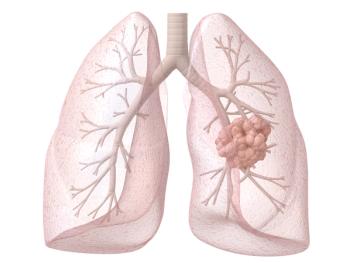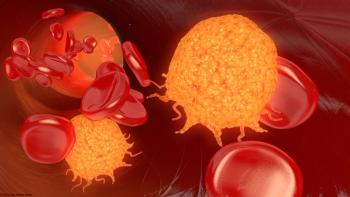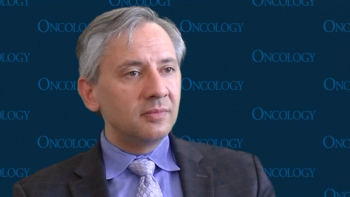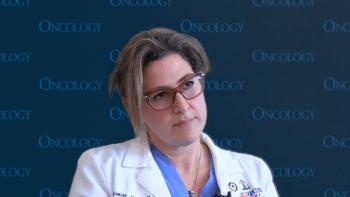
Bevacizumab-nwgd was assessed to be comparable to bevacizumab based on a submission showing pharmacokinetic, efficacy, safety, and immunogenicity data.

Your AI-Trained Oncology Knowledge Connection!


Bevacizumab-nwgd was assessed to be comparable to bevacizumab based on a submission showing pharmacokinetic, efficacy, safety, and immunogenicity data.

Real-world data may support a new way to consider follow-up treatment for patients who are older with extensive-stage small cell lung cancer.

Data from the LOXO-TRK-14001, SCOUT, and NAVIGATE trials support the full approval of larotrectinib in NTRK gene fusion-positive tumors.

Postoperative length of stay ranged from 4 to 9 days for patients who underwent percutaneous transesophageal gastrostomy for malignant bowel obstructions.

Investigators will assess the safety, pharmacology, and maximum tolerated dose of ST-001 in relapsed/refractory SCLC as part of a phase 1a/1b trial.

Quality of life improvements can be made if clinicians better understand auditory attention decay after cancer treatment in pediatric patients with cerebellar tumors.

Tambiciclib was well tolerated in patients with acute myeloid leukemia with myelodysplastic-related changes, and no new safety signals were observed.

The phase 3 MIRAGE trial findings show that PROSTOX ultra was validated as a biomarker to predict genitourinary toxicity following SBRT.

The International Psycho-Oncology Society announced the first-ever WPOD on April 9, 2025, to bring more focus to psychosocial care in cancer therapy.

It is crucial that oncologists and other cancer care specialists collaborate with psycho-oncology specialists to optimize patient treatment outcomes.

World Psycho-Oncology Day is an initiative aimed at spreading awareness and pursuing the further integration of psychosocial care into cancer treatment.

Organizations such as ASCO and ESMO recognize the importance of integrating psychosocial care into cancer treatment.

Combining durvalumab with chemotherapy produced a good safety profile without increasing surgical risk in the phase 2 iNDUCT-GETUG V08 trial.

A phase 2 study found that treatment with tumor-infiltrating lymphocytes elicited a partial response rate of 15.1% in patients with gastrointestinal cancers.

The FDA approved nivolumab with ipilimumab in adult and pediatric patients with CRC based on data from the phase 3 CHECKMATE-8HW trial.

Palbociclib with endocrine therapy did not improve outcomes in hormone receptor–positive, HER2-negative breast cancer but improved invasive DFS in lobular disease.

Focused, high-dose radiotherapy doses may prolong survival and the interval to subsequent therapy for patients with advanced prostate cancer.

Surufatinib/toripalimab elicited an ORR of 57.1% in patients with treatment-naïve NSCLC and 15.8% in patients with pretreated SCLC in a phase 2 trial.

The ESMO Precision Oncology Working Group recommendations can serve as guidance to define standards for MTBs to integrate precision oncology into practice.

Data show increasing use of proton therapy overall but widening gaps in populations who have access to this treatment, Curtiland Deville Jr, MD, says.

Patients with ALK-positive NSCLC not vulnerable to neurological adverse effects or prone to weight issues, might benefit from treatment with lorlatinib.

A real-world analysis showed that 56 mg/m2 of carfilzomib once weekly offered many benefits over 56 mg/m2 twice weekly and 70 mg/m2 once weekly in myeloma.

A lack of guidelines, a loss of follow-up, and out-of-state procedures are all potential reasons for 26% of patients undergoing appendectomy.

Experts from Sibley Memorial Hospital discuss how multidisciplinary work has enhanced outcomes such as survival and resource use at their institution.

Time to deterioration in physical functioning and role functioning was similar among those receiving belzutifan vs everolimus for renal cell carcinoma.

Treatment with KRAS inhibitors may help mitigate a common driver of genetic alteration across a majority of pancreatic cancers.

Various methods of communication ensure that members from radiation oncology, pathology, and other departments are on the same page regarding treatment.

Postoperative complications and mortality after standard or postponed surgery for esophageal cancer after active surveillance were similar in both groups.

The staged approach to colectomy offers survival benefits, and it may help avoid unnecessary procedures that only require appendectomy.

Comprehensive prehabilitation may help prepare patients for bladder-preserving surgery, helping to optimize quality of life outcomes.